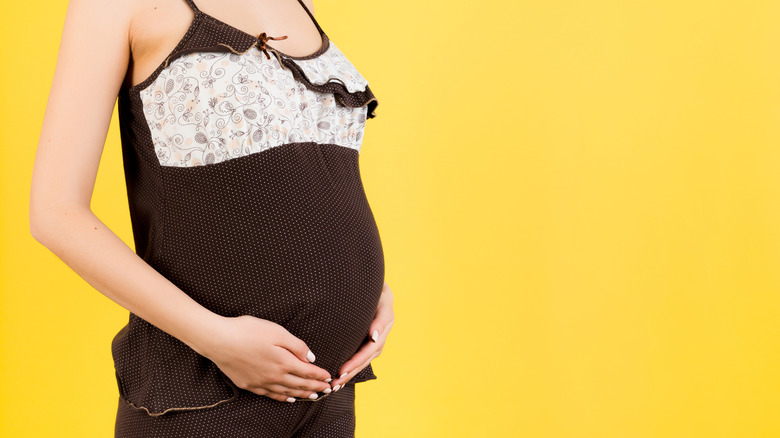
We all dream. Even if you don’t always remember them when you wake up, dreams are something that unite us all. It’s thought that even fetuses dream while inside the womb (via Fatherly), while many animals do too — something you’ll know if you’ve ever seen the family dog cry out or growl in their sleep (via American Kennel Club). We all remember the occasional nightmare as a child after watching that scary movie we were told not to, and we’ve all had our alarm go off in the middle of a particularly exciting dream, sharply bringing us back into the real world.
Dreams can be about almost anything, and for centuries upon centuries, people have tried to apply meanings to their dreams. From dreams where you’re flying to dreams about your childhood, we often have questions about how to interpret them. But what about the dreams people have when they’re pregnant — when, let’s face it, sleeping can be frustrating enough? What do they mean? Here’s the truth about dreaming while pregnant.
Pregnant women are more likely to have morbid dreams

There have been studies comparing the dreams of pregnant women with the dreams of those who weren’t pregnant at the time to find out if there are any differences. It was found, as you might expect, that infants and children featured more in the dreams of pregnant women, and of the pregnant women in the study it was more likely to be those in the late third trimester of the pregnancy. Not only that, but dreams during pregnancy were more likely to features themes like childbirth, fetuses, and pregnancy (via Medical News Today).
Something perhaps more unexpected is that pregnant women are more likely to have more morbid dreams than non-pregnant women, and vivid dreams and nightmares have frequently been observed during pregnancy (via Sleep Foundation).
But why is this? The Sleep Foundation suggests that changing hormones could play a part in the nature and themes of dreams during pregnancy, while your dreams might simply be influenced by what’s on your mind. If you’re expecting a baby, you’ll probably be thinking about pregnancy and parenthood more while you’re awake than somebody who doesn’t have any children, for example, and likewise, you might be more prone to worrying and anxiety too.
Source: Read Full Article
